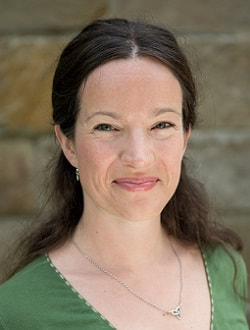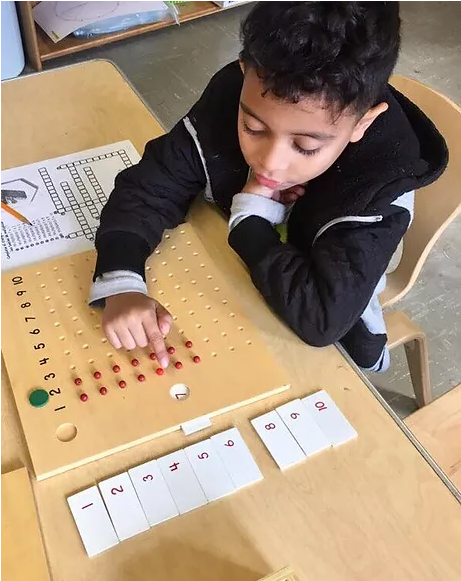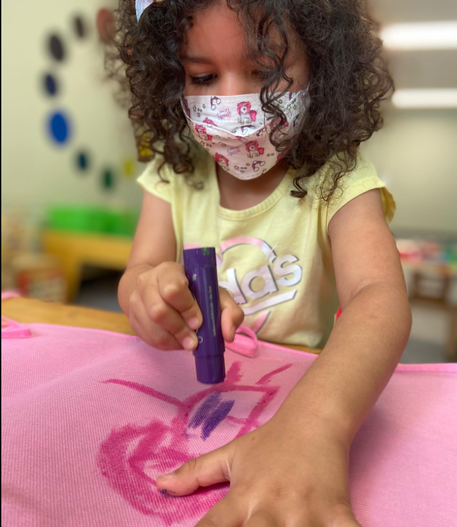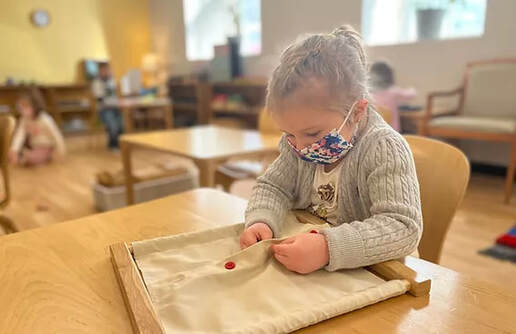August 2022 Featured Interview
Part of Focus on Youth 2022
Proud sponsors of this special issue:
Educator Molds Young Minds in an Environment that
Fosters Creativity and Self-Awareness
Interview with
Diane Nickerson
Founder of Castle Island Bilingual Montessori
About Diane:
Passionate about creating a school environment with the highest quality of education, Diane Nickerson founded Castle Island Bilingual Montessori in 2012.
With more than 25 years of experience as an educator, she has achieved NYS certificates as a teacher of elementary education, English as a Second Language, Spanish, and as a K-12 Administrator. Her career has included work as a bilingual teacher trainer and as a Montessori school administrator. Trained in Montessori school management at the Center for Montessori Education | New York, she holds an Administrator Credential from the American Montessori Society.
While raising her four sons to be bilingual, she had been seeking a school for them that would not only meet their language goals but would also provide creative opportunities for their inquisitive minds and active bodies. After some research and travel, Diane found an ideal approach in the Montessori method that holistically meets the learning needs of each child. Wanting to create a school that merges optimal learning environments for both bilingual language immersion and the Montessori educational approach, she founded Castle Island for children living in the Capital Region of New York State. She leads the school community to uphold an optimal intercultural and innovative learning environment, working toward continued school improvement to meet the mission: providing accessibly, world-class education. She is proud that Castle Island, with its mission toward social justice, creates an intentional and inclusive space for learning where each child and his/her family is honored.
Passionate about creating a school environment with the highest quality of education, Diane Nickerson founded Castle Island Bilingual Montessori in 2012.
With more than 25 years of experience as an educator, she has achieved NYS certificates as a teacher of elementary education, English as a Second Language, Spanish, and as a K-12 Administrator. Her career has included work as a bilingual teacher trainer and as a Montessori school administrator. Trained in Montessori school management at the Center for Montessori Education | New York, she holds an Administrator Credential from the American Montessori Society.
While raising her four sons to be bilingual, she had been seeking a school for them that would not only meet their language goals but would also provide creative opportunities for their inquisitive minds and active bodies. After some research and travel, Diane found an ideal approach in the Montessori method that holistically meets the learning needs of each child. Wanting to create a school that merges optimal learning environments for both bilingual language immersion and the Montessori educational approach, she founded Castle Island for children living in the Capital Region of New York State. She leads the school community to uphold an optimal intercultural and innovative learning environment, working toward continued school improvement to meet the mission: providing accessibly, world-class education. She is proud that Castle Island, with its mission toward social justice, creates an intentional and inclusive space for learning where each child and his/her family is honored.
|
When not working on developing the programs and growth of the school, she cooks dinner for her family, practices competitive Irish step dance, enjoys the Adirondacks for hiking and skiing, listens to her sons tell stories, and daydreams.
About Castle Island Bilingual Montessori: Since its founding in 2012, Castle Island Bilingual Montessori has provided world-class, accessible education immersed in English and Spanish in a fully implemented Montessori learning environment for children of the Capital Region of New York. Immersion in a bilingual, diverse Montessori school offers students the unique challenges and opportunities to become creators of solutions and leaders of a technologically advanced, environmentally vital, and peaceful global community. The learning environment honors each child’s potential and is designed to foster curiosity, collaboration and innovation. |
Diane Nickerson is Interviewed on an Episode of #SmallBiz518
|
Jillian Crocetta, contributor, spoke with Diane about her passion for Montessori educational philosophy, individualized instruction, and the benefits of a bilingual education.
Founding a Montessori school is no small feat. What inspired you to embark on this journey?
Something just did not feel right in conventional education. Sure, I always was evaluated highly, but I hated being interrupted by bells, and I did not feel like I was making a real connection with the children.
Out of curiosity one day, I typed in ‘Montessori’ [on the search bar] and came across a web page with two paragraphs detailing Montessori education. Those two paragraphs explained an educational style that checked off all the boxes I could think of. I knew I needed to learn more.
I sought out a Montessori school in Syracuse, NY and observed class sessions of all different age groups. Afterward, I went to the director’s office to ask questions, but when I opened my mouth to speak, I found that I couldn’t. I was so overwhelmed by emotion that I just started to cry. I thought I knew children, but I did not know that children could learn like that, and it really floored me. I shifted the rest of my life to follow all things Montessori – first for my own children, and then for the children in the community which let to founding Castle Island Bilingual Montessori.
Opening a Montessori school in Albany presented its own challenges. I had to explain to a lot of people that Montessori education is scientifically based and a good educational investment. I felt like a goldfish in an ocean, swallowed up by salt water. Ten years later, people are thankful that there is a Montessori school here. But it took a lot of convincing.
Founding a Montessori school is no small feat. What inspired you to embark on this journey?
Something just did not feel right in conventional education. Sure, I always was evaluated highly, but I hated being interrupted by bells, and I did not feel like I was making a real connection with the children.
Out of curiosity one day, I typed in ‘Montessori’ [on the search bar] and came across a web page with two paragraphs detailing Montessori education. Those two paragraphs explained an educational style that checked off all the boxes I could think of. I knew I needed to learn more.
I sought out a Montessori school in Syracuse, NY and observed class sessions of all different age groups. Afterward, I went to the director’s office to ask questions, but when I opened my mouth to speak, I found that I couldn’t. I was so overwhelmed by emotion that I just started to cry. I thought I knew children, but I did not know that children could learn like that, and it really floored me. I shifted the rest of my life to follow all things Montessori – first for my own children, and then for the children in the community which let to founding Castle Island Bilingual Montessori.
Opening a Montessori school in Albany presented its own challenges. I had to explain to a lot of people that Montessori education is scientifically based and a good educational investment. I felt like a goldfish in an ocean, swallowed up by salt water. Ten years later, people are thankful that there is a Montessori school here. But it took a lot of convincing.
|
Please elaborate on what attracted you to Montessori education.
The way we understand education is based on a model of worship service. There is an authority figure standing in front of a seated group, and the seated group is expected to get information from the authority figure. But this is not the optimal way for humans to learn. Human development is based on experiences in our environment and the interactions we have with our environment. Humans learn through asking questions, following curiosities, and feeling purposeful. Conventional educational settings do not give us the opportunity to learn this way. Montessori education, however, gives children the opportunity to follow their interests. Children are encouraged, respected and honored while working collaboratively and individually within a community of learners for three years or more. In conventional education, you could be an A-plus student your whole life, but you are valued based on your grade. In a lot of ways, Montessori education is resonant of college education because you can choose what you study, where you study, and how you will complete your assignments. Montessori students have freedom. They are trusted and develop a deep sense of self-awareness. I believe that children should feel these things. The way that children spend their days is also important to me, so I try to cultivate an exciting environment because children spend so much of their lives, from early childhood through their adolescence, in school. |
Photo Courtesy: Castle Island Bilingual Montessori
|
We must talk about our mutual alma mater, Hobart and William Smith Colleges. Did your education impact your career path?
I was eight years old when I finally learned that you could grow up and not be a teacher. My parents were both public school teachers and were friends with a lot of other teachers. Everyone around me was a teacher. I knew that there were other professions, and I explored them a bit, but teaching was engrained in me. I wanted to see how children grew and developed over time, and I wanted to know what role I could play in that growth.
In college, I majored in anthropology, which I believed to be the most all-encompassing discipline, and I minored in Russian Studies, Women’s Studies and Education. I also had the opportunity to study abroad in the Dominican Republic, and though I did not know what to expect, here we are today. I am a fluent Spanish speaker and my sons’ father is Dominican.
I was eight years old when I finally learned that you could grow up and not be a teacher. My parents were both public school teachers and were friends with a lot of other teachers. Everyone around me was a teacher. I knew that there were other professions, and I explored them a bit, but teaching was engrained in me. I wanted to see how children grew and developed over time, and I wanted to know what role I could play in that growth.
In college, I majored in anthropology, which I believed to be the most all-encompassing discipline, and I minored in Russian Studies, Women’s Studies and Education. I also had the opportunity to study abroad in the Dominican Republic, and though I did not know what to expect, here we are today. I am a fluent Spanish speaker and my sons’ father is Dominican.
What are the benefits of an early bilingual education?
Montessori educators know from the study of human development that between the ages of three and six children acquire everything in their environment as naturally as taking a breath in. Maria Montessori called this period of time ‘the absorbent mind.’ As children acquire their surroundings, they are constructing their adult personalities. Part of this construction can be learning a second language. During this time, dendrites are growing within the brain. And these dendrites connect a concept with the English and Spanish words associated with it.
During this period of development, you are able to make a lot of connections. Children come to know that there is more than one way to solve a problem, and when faced with interpersonal conflict, there is more than one way to solve an issue. And then there’s the obvious: When you know two languages, you can communicate with more people and understand more cultural nuance because culture is embedded in language.
Montessori educators know from the study of human development that between the ages of three and six children acquire everything in their environment as naturally as taking a breath in. Maria Montessori called this period of time ‘the absorbent mind.’ As children acquire their surroundings, they are constructing their adult personalities. Part of this construction can be learning a second language. During this time, dendrites are growing within the brain. And these dendrites connect a concept with the English and Spanish words associated with it.
During this period of development, you are able to make a lot of connections. Children come to know that there is more than one way to solve a problem, and when faced with interpersonal conflict, there is more than one way to solve an issue. And then there’s the obvious: When you know two languages, you can communicate with more people and understand more cultural nuance because culture is embedded in language.
|
Photo Courtesy: Castle Island Bilingual Montessori
|
I noticed that Castle Island has a very active arts program. Can you talk about the importance of arts in education.
Art is part of the five curriculum areas of Montessori, and children are encouraged to observe art in the world around us. Students have one-on-one flower arranging lessons, and lessons like these ask children to consider what they like to look at, touch or listen to. It is a wonderful extension of how we understand care for ourselves, our community and our environment. Montessori education also promotes freedom of movement. There are two movement programs taught by native Spanish speakers at our school: Movement in sports and movement with music. We are also launching a music composition course soon, which includes writing music, singing and playing instruments. The school has summer programs as well. Castle Island offers a Spanish immersion summer camp program with thematic activities. The camp uses Montessori philosophy in that we honor each child, and children can work at their own pace, but our summer programs do not include lessons with Montessori material. Right now, at the end of Cooking and Baking week, the children are making ensalada de frutas, with manzana, and they are learning about the language as they are having hands-on summer fun. |
You mention on your website that you invite parents and community partners into your network of collaboration. Can you talk about the importance of celebrating the diversity of your community?
|
I went to a big high school that was fairly diverse, and I was always proud that I was in a school setting that was representative of the population of our community. And that always stuck with me. I wanted Castle Island to represent the community.
Castle Island is a private school, but not private in the way that makes it feel exclusive. It is really important to me that part of our mission is that we are intentionally inclusive. And inclusive is not rhetoric at Castle Island. We represent the community, and it is very important to me that everyone knows that they are welcome there. We do our best to not only communicate that but to emulate it. If we don’t represent the community, what are we? Children in Montessori education are encouraged to care about what humans can do, how they fit into the community, and how the community encourages them. |
"If parents are looking for a sanctuary for children, they should visit a Montessori school. We invite our current parents as well as prospective parents and community partners to visit and observe a class in action because seeing is believing." ~ Diane Nickerson |
How did COVID-19 impact Castle Island?
Like all schools, Castle Island was tremendously impacted. Montessori education is a hands-on educational method, and we had to determine what hands-on education looked like remotely.
Like all schools, Castle Island was tremendously impacted. Montessori education is a hands-on educational method, and we had to determine what hands-on education looked like remotely.
|
Photo Courtesy: Castle Island Bilingual Montessori
|
Often people associate school with its building, as a place. But during COVID, their school was not a building. I tried to communicate to the community that the school is the people, the staff (called guides), the leadership, the families and the children.
We tried to figure out what the children needed and how we could help provide that environment. We learned to make YouTube videos for morning meetings, so we could accommodate for families’ different schedules. Students met with their teachers over FaceTime for the first couple of months, and the assistant teacher would read them English and Spanish stories over FaceTime. Our specials, like PE, art, and dance class were on Zoom. In the summer of 2020, we were back in person and have been back ever since. |
What does the future of bilingual education and Montessori education look like to you?
Montessori is the perfect vehicle for bilingual language acquisition because the lessons are presented individually. Teachers are meeting the children wherever they are, academically, socially, and in our school, linguistically.
Children are working at their own pace, and they are doing this with hands-on material, which enables meaning of both academic content and vocabulary of a new language concrete. Across the curriculum from literacy, mathematics, sciences, geography and the arts, every piece of knowledge is practice with its concrete form before moving to abstraction.
The granddaughter of Maria Montessori said in a speech in the 1990s that we’ll know Montessori has been successful in the world when it is no longer called Montessori, but it is just called school.
Where do you find Sanctuary?
Recalling memories of when I was feeling really happy, joyful or peaceful is sanctuary for me. Irish step dancing is also a sanctuary. I can only think about dancing when I am dancing, and it is impossible to not feel pure joy when leaping through the air with friends.
Montessori is the perfect vehicle for bilingual language acquisition because the lessons are presented individually. Teachers are meeting the children wherever they are, academically, socially, and in our school, linguistically.
Children are working at their own pace, and they are doing this with hands-on material, which enables meaning of both academic content and vocabulary of a new language concrete. Across the curriculum from literacy, mathematics, sciences, geography and the arts, every piece of knowledge is practice with its concrete form before moving to abstraction.
The granddaughter of Maria Montessori said in a speech in the 1990s that we’ll know Montessori has been successful in the world when it is no longer called Montessori, but it is just called school.
Where do you find Sanctuary?
Recalling memories of when I was feeling really happy, joyful or peaceful is sanctuary for me. Irish step dancing is also a sanctuary. I can only think about dancing when I am dancing, and it is impossible to not feel pure joy when leaping through the air with friends.








